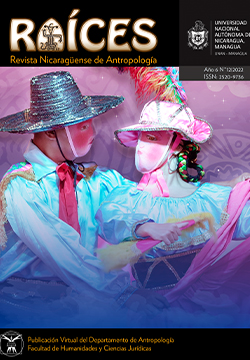Informal conversations as a data collection technique
to address gender violence and masculinities
DOI:
https://doi.org/10.5377/raices.v6i12.15629Keywords:
Informal conversation, ethnography, gender, masculinities, MoskitiaAbstract
This essay reflects on the significant contributions of the use of the technique of informal conversations to address gender violence and masculinities. The reflections are oriented to the ethnographic notes of the field work lived in the Honduran Moskitia and embodied in a Campo Diary. The essay summarizes the experiences of three moments: First, in the interaction, coexistence and social life in the community, achieving participatory involvement in the daily life of the places visited. The second moment rescues the participation in the collective processes of the women’s grassroots organization where the supervised professional practice was carried out. Finally, it rescues the participation of a “Diagnosis on the situation of gender violence in Moskitia” where a work team was formed with a specialist in the matter. In conclusion, the technique of informal conversations provides a contribution to the researcher when applied in ethnographic contexts, it introduces us to the community, especially when working on issues related to gender and masculinity processes.
Downloads
References
Devillard, M. J., Mudanó, A. F., & Pazos, Á. (2012). Apuntes metodológicos sobre la conversación
en el trabajo etnográfico. Política y Sociedad, 49(2), 353-369.
Espinal, J. A. (2021). Apuntes diario de Campo Moskitia hondureña. Sin publicar.
Guber, R. (2001). La etnografía, método, campo y reflexividad. Bogotá: Grupo Editorial, Norma.
doi:ISBN 958-04-6154-6
Herlihy, L. H. (2007). Sexual Magic and Money: Miskitu Women’s Strategies in Northem Honduras.
Ethnology, 2(45), 143-159. Obtenido de https://kuscholarworks.ku.edu/handle/1808/11802
Herlihy, L. H. (2015). Magia amorosa, autonomía política y posmodernidad. Dimensión Antropológica, 63, 99-123. Recuperado el 25 de marzo de 2022, de https://revistas.inah.gob.mx/index.php/dimension/article/view/7652
Pizarro, C. (2014). La entrevista etnográfica como práctica discursiva. Revista de Antropologia, 57. Obtenido de https://www.jstor.org/stable/26605458?read- now=1&refreqid=excelsior%3A83fa9122567ccd9e057ed4f853396508&seq=9#page_scan_tab_contents
Roldan, A. A. (1995). La invención del método etnográfico.Reflexiones sobre el trabajo de campo. Universidad de Granada. Recuperado el 28 de marzo de 2022, de https://www.ugr.es/~aalvarez/ observadorcultural/Documentos/Alvarez_1995_esp.pdf.
Downloads
Published
How to Cite
Issue
Section
License
Copyright (c) 2023 © Universidad Nacional Autónoma de Nicaragua, Managua, UNAN-Managua

This work is licensed under a Creative Commons Attribution-NonCommercial-ShareAlike 4.0 International License.




